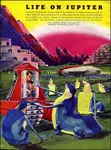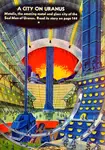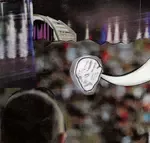caught under the clouds:
donald suddaby's
prisoners of saturn
This book so far stands alone - the only such volume in existence: a full-blown, novel-length adventure on a worthily wonderful Saturn. Classed as a tale for younger readers, it is nevertheless without a trace of condescension and should enthrall any adult OSS fan, such connoisseurs being necessarily young at heart.
Harlei: I'll say! In fact it's almost too mature for me in places; I had to look up "sympodial"...
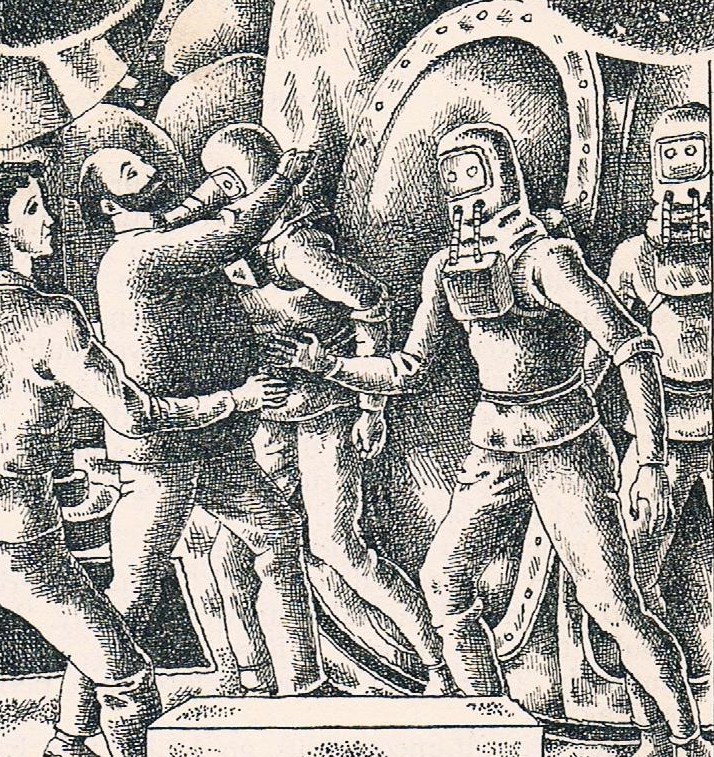 misunderstanding surface conditions on Saturn
misunderstanding surface conditions on SaturnZendexor: But then that's what you often get in old-style literature for youngsters: an advanced vocabulary, sophistication... the only adult things it lacks are pornography, foul language and obscenity. 'Fraid the reader will have to subsist without those, and make do with wholesome wonder and excitement instead.
Mind you, the mildly xenophobic narrator is not too keen when he learns that
"...it happens that we have some of them here, in Cambridge."
"Martians? The creatures who scared the breath out of me for most of my boyhood?"
"Yes. Tchelkov had them up, to check on some calculations. They are not at all terrifying, really... you get used to the eight fingers on each hand and the lack of ears."
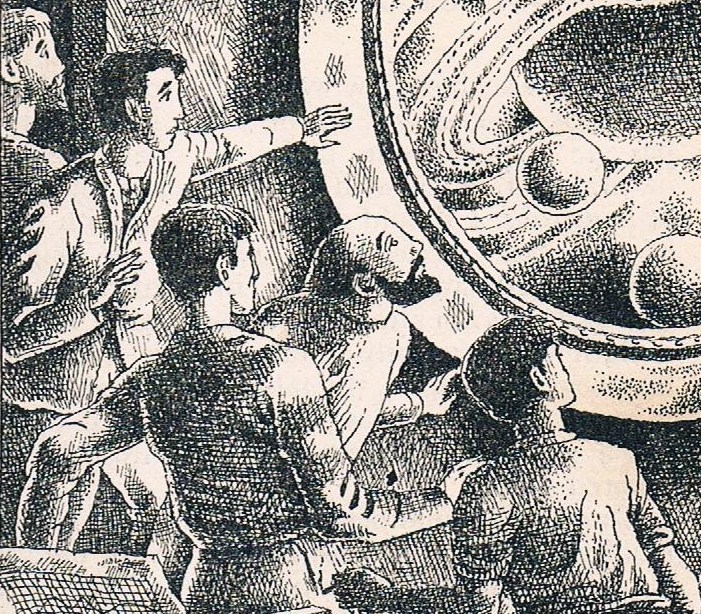
So we're in a future where Martians are well known and taken for granted. But it is one thing to have explored the inner Solar System, and quite
another to aim at Saturn. A completely new method of travel is
required. And when it is achieved, our musician hero - recruited by the
casual whim of the pioneers in happy-go-lucky OSS fashion - pays the
due tribute of awe at the infinite void.
...I felt trapped like an eel in a basket, helpless amid the primeval wonder, the vastness and simplicity and power on which our existences are the merest limpets. Tchelkalov turned and went away to the chart-room, but Paul and Jonah, Samoylenko and Doran and I still hung fascinated before the glass. What phrases of mine can ever hope to convey a fraction of the splendour of outer Space? ...the myriad burning lamps of creation...
Prisoners of Saturn is certainly nowhere near the hard-science end of the sf spectrum, yet it has what one might call "costume-science", a colouring of token respect for scientific plausibility - here to be seen in the fact that the adventurers do not expect to find life, or habitable conditions, upon Saturn. They consequently prepare themselves with oxygen supplies and "anti-g suits" (Suddaby erroneously assumes that Saturn's surface gravity is significantly higher than Earth's). They also, quite reasonably, expect it to be dark at the bottom of Saturn's thick atmosphere.
They land - and find the unexpected.
the great carved landscape
Harlei: This is the pay-off, eh? The moment when the reader finds out if the author is going to keep his promises...
Zendexor: Right, and it's on page 70 of a 190-page book, so we know we've still got 120 pages to go, so we goggle in anticipation of a real Saturnian treat. And the promise is fulfilled.
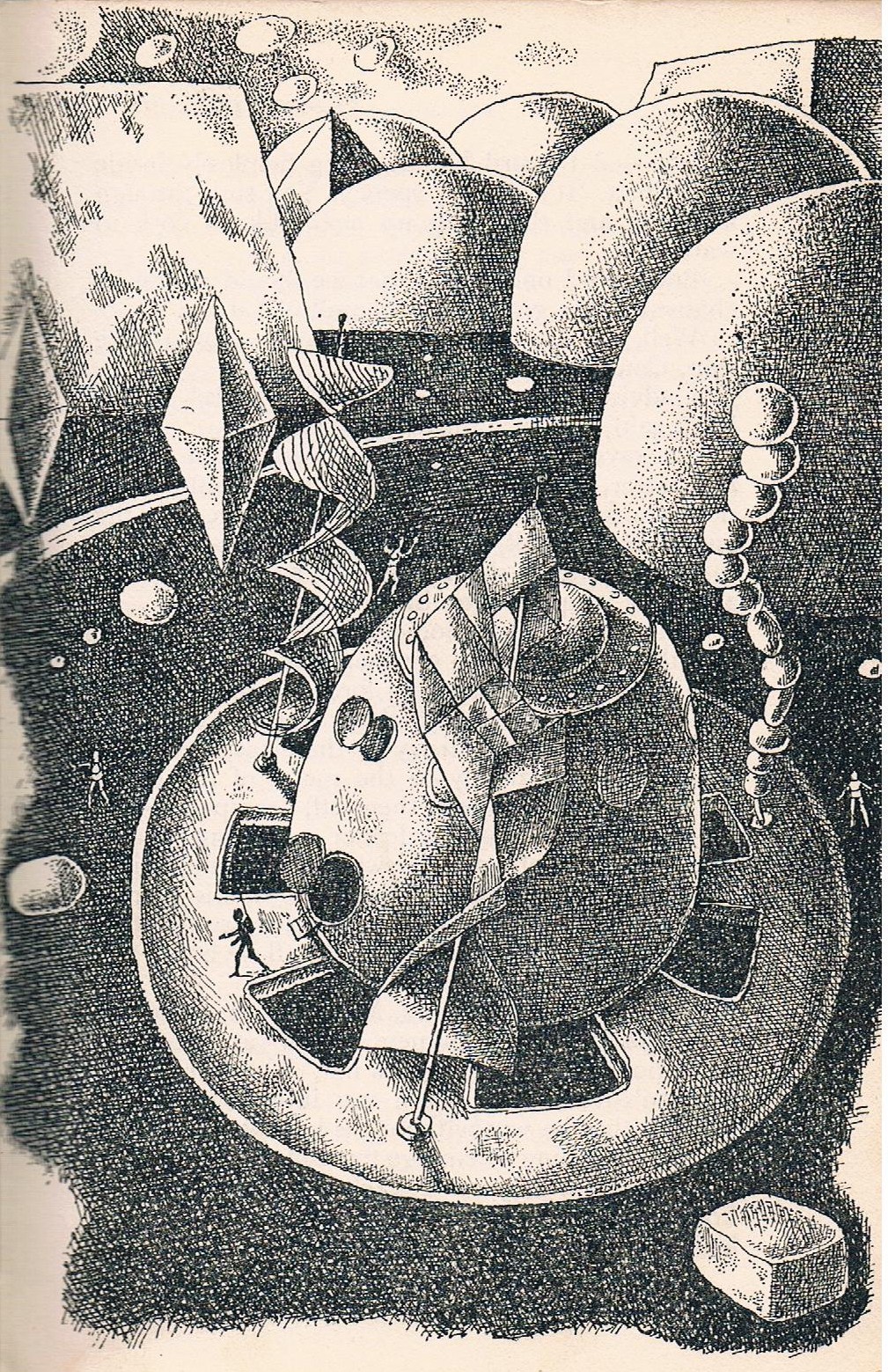
Brilliant light flooded in upon us. For a full minute I was blinded by it, aware only of luminous haze outside, and had to wipe the tears from my eyes again and again. When finally I could look out I saw - a perfectly square mountain.
Our ship, absolutely undamaged, was lying upon what seemed to be a circular plain, brown in colour and devoid of vegetation. The immense square mountain I had first seen was no isolated example of symmetry, for two vast diamond-shaped hills stood one on each side of it, superb in form and overwhelming in effect, with a long line of rounded summits behind them, every summit of the same precise contour and height. I was agape. Was this a world where giants played with the mountains as we carve bits of wood and stone?
This turns out to be a spot-on guess by Travis, the unscientific musician-narrator, though the "giants" are giants in power, not in any human form. Travis guesses again successfully after the explorers spot a stream, with flowers nearby. The scientists were arguing:
..."It must be liquid ammonia. The same corrosive chemical has probably carved all the mountains."
"Do lilies grow in ammonia?" Paul retorted. "I see some scarlet cups floating over there..."
"A concentration of mineral, maybe," Jonah said, refusing to be defeated in his arid beliefs.
Just then Tchelkalov appeared, tediously walking towards us.
"Vodá, vodá," he repeated... "The instruments show there is water on this planet, Paul Bittner."
"But how is that possible, sir? The infra-red showed clouds of methane and ammonia gas. Water would precipitate ammonia at once: it would rain ammonia, show ammonia, destroy everything."
"Nevertheless, the stream we see is water."
It is here that Travis chips in with his suggestion that intelligent Saturnians have put up an energy screen to confine the poisonous elements of the atmosphere to its upper reaches, leaving the surface habitable.
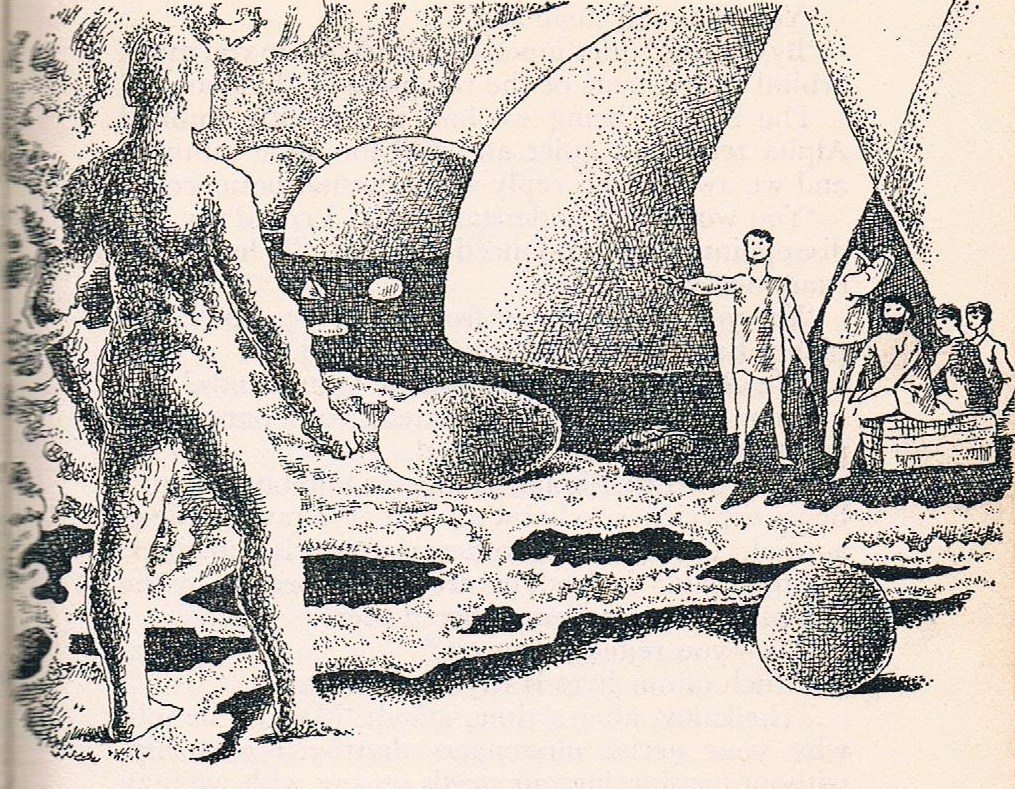 The meeting with "Alph"
The meeting with "Alph""But then," Kit Doran put in - he had crawled up with Shouisky from an inspection of the engine-room - "if there are such beings as Saturnians, how have they evolved in the first place among the gases?"
I grew steadily more inventive. "They need not have evolved here. One of the satellites may have a kindlier atmosphere, in which the race grew up. When they achieved scientific power they took over the mother planet: they expelled such chemicals as were enemies to life, wafted them into the cloud belt, put up an energy screen, and oxygenized the Saturnian atmosphere."
"Bless me!" ejaculated Fred Jones. "The advantages of not knowing any science! You just invent facts to fit wishes."
Stid: And there you have as good a statement of your OSS writing-philosophy, Zendexor, as one might ever wish to find.
Zendexor: Quite so! But note the implied respect for science, in the urge for explanations, wish-fulfilling though they be.
Then having grounded us in some show of realism, the author feels free for the next leap of imagination. So the awesome beings who rule Saturn are introduced into the story.
nebular dominance
The first encounter results in the destruction of the humans' space-vessel.
There followed an absolutely dumbfounded pause. The great carved hills regarded us indifferently; the belt of cloud gas above remained quite unmoving, shutting out the sun, the stars, and the depressing distances to our own planet. We felt no breeze, no stirring of anything about the handsome but uncomfortable landscape, from which the very memory of movement seemed to have fled, which had never uttered a sound or given us a smile or a frown. I had the sensation that I was standing among the scenery for a pageant - with all the actors gone home.
The men learn from the start that they are no match for the mountain-sculpting intelligences which dominate this giant world. We are also given glimpses of lesser creatures - the "land-fish", for instance:
...gliding with a genuine piscatorial motion, first right, then left, then astonishingly plunging into the soil.
We thereby also get a feeling for the friable, granular soil of Saturn. Other riches of the book include impressions of evening on Saturn -
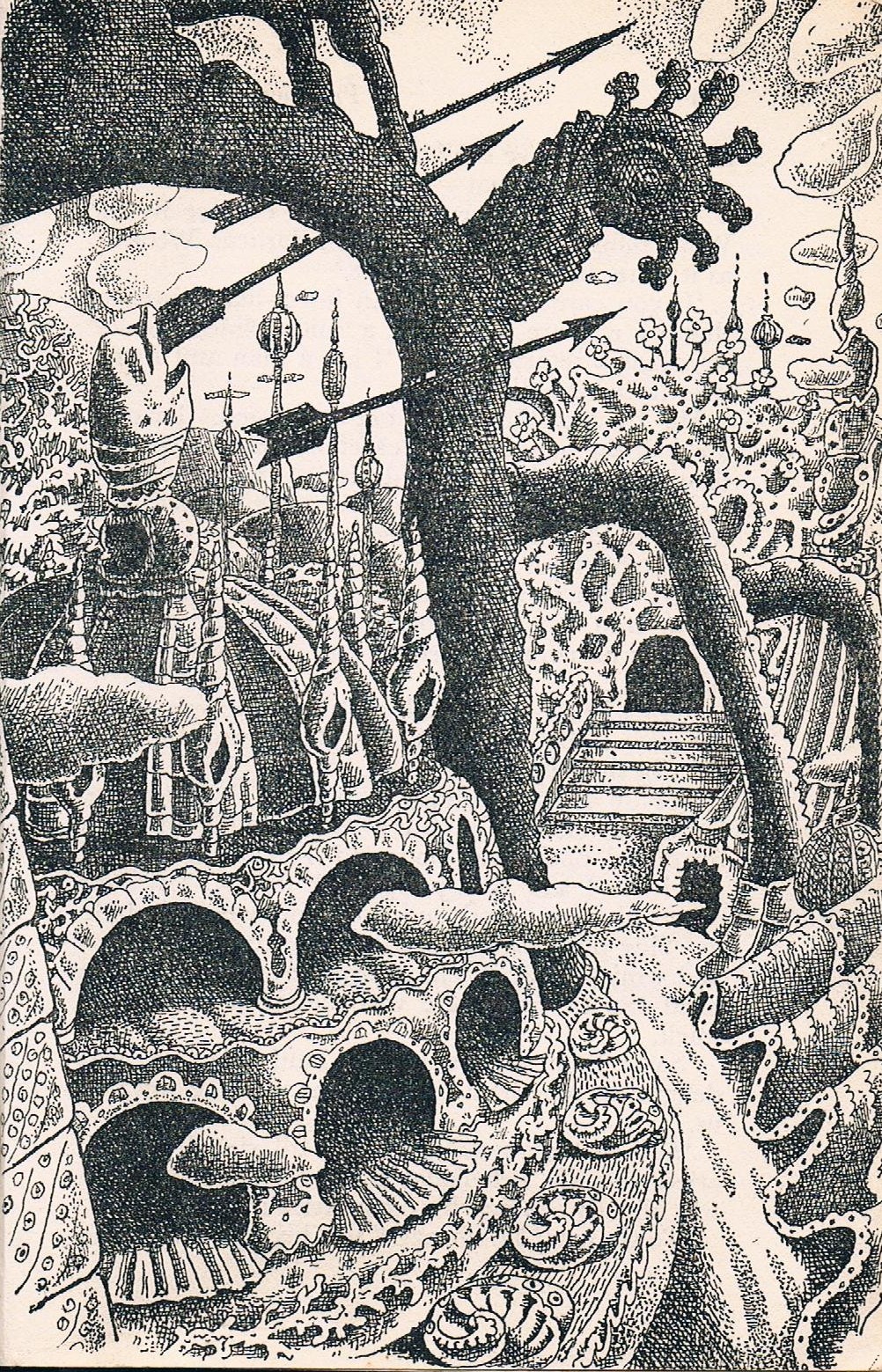 the conchoid city
the conchoid city...the light on the far horizon strangely began to fail. The blaze through the equator clouds, which we had decided came from the ring system, did not falter at all: only the horizon grew dark, with inky shadows from our rock and from the mountain tops streaming towards it...
So there is never full darkness. But the night weighs on the soul:
...An ashen light, coming only from the clouds beneath the ring system, made everything one-sided - with intense blackness on the horizon. Our overhanging rick was bright by the fire, but stretched away into gloom. The plain was wholly black, its river faintly gleaming. Some of the oval and polyhedral rocks which littered the ground showed fantastic flecks and lines of light, whilst beyond them the mountains glowed weirdly, a few brilliantly white and many in a pallid gloaming.
There was no sound over it all, a passive fact that touched the musician's ear with horror. Night on our own planet is full of the murmur of wind, perhaps of the noise of an aircraft or a train, or the bark of a dog, but on Saturn the quiet was numbing...
The stranded humans debate the wisdom of having lit a fire, and so on. They know how small they are. Tchelkalov speculates - rightly as it turns out - that Saturn's ring system is artificial.
"Mr Tchelkalov," I asked, "what are your logical deductions? Is it possible that life here has developed a form which we shall not even recognize as life?"
"It is very possible, Mark Travis. The destructive clouds point to a range of needs and reactions altogether outside anything which we humans - "
His voice trailed away into a brooding silence.
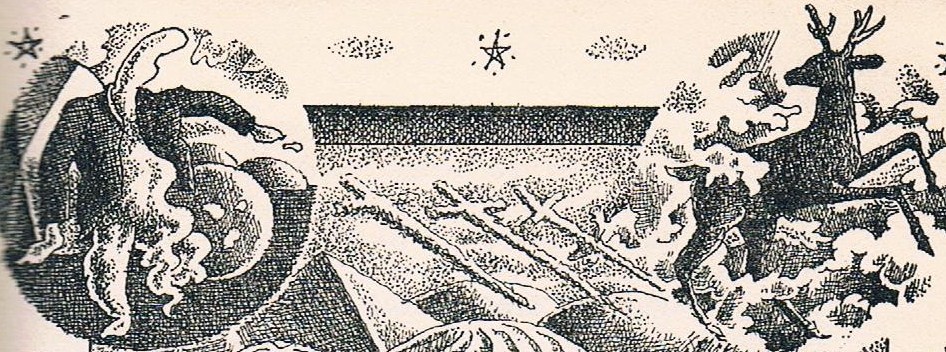
The humans still don't get it. The nebulous destroyers of their ship weren't some mechanism of the Saturnians - they were the Saturnians.
It was manifest that our leader had penetrated a new vein of thought and we all sat awaiting his conclusions. I stared into the fire - and suddenly the reserve of Saturn for the first time was broken by a cry.
"Ayiya! Ayiya, ayiya, ayiya..."
The unexpected shriek travelled away and was echoed among the hills. Enigmatic gleams responded to it from the darker summits; about the ring-lit mountains we could see elliptical clouds steadily rising...
The Saturnians hunt at night. An intense episode follows in which the men could hear
...scraping, runny noises all over the plain. Once I fancied I saw an object like a seal on the move.
"Ugh - how awful," murmured Kit suddenly. "Against that bright mountain - see - cloudlets soaring up, carrying a kind of crocodile..."
"They eat flesh, then."
"Eat? Without mouths or stomachs?"
"Absorb it, let us say."
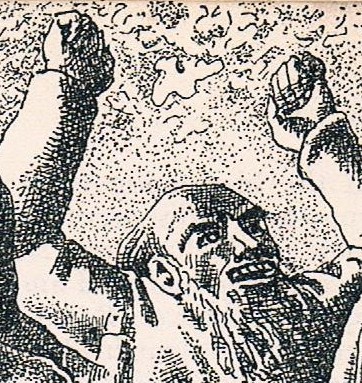
What can men do in such a nightmare, but crawl to the extreme end of their pathetically useless rock-shelter?
...There we lay motionless, pressed to the ground, scarcely daring to breathe as a yet louder yelling broke out horribly near to us. For an hour that aerial hunting went on, and we cowered like so many mice away from owls. Thoughts of final despair raced through my mind. I expected droplets to settle upon me, to seize me, bear me upward; in a word, I expected death.
But how resilient is the human frame! No sooner had the yells grown fewer in number, sounding fainter and farther off, than I fell ignominiously asleep. We had suffered many alarms since the landing black-out and I suppose weary old nature re-asserted itself. I slept like a babe, deeply refreshing slumber, and when I awoke clear daylight was upon the Saturnian landscape once more. The carved hills were splendid with light, the cloudy covering of the sky had taken on a lovely pearly glow, and here and there showed pinks and touches of blue and silver. A very gentle wind blew in my face from the mountains, fanning our fire to greater life.
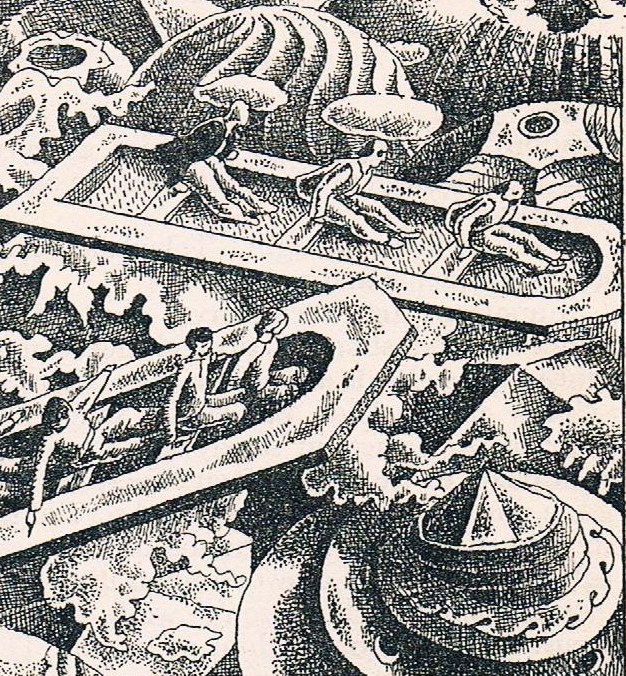 riding Saturnian flyers
riding Saturnian flyers"How long have I slept?" I asked, sitting up and rubbing my eyes.
"Napoleon recommended six hours' sleep for a man, seven for a child, eight hours for a fool," Kit said, turning round from some cooking which occupied him by the fire. "You've had your proper eight hours."
I have quoted this particular passage at some length as I thought it might give three flavours of the book's style - the narrative, the reflective and the conversational. But now I want to say more of the scope of this story.
The mighty sentient clouds are, of course, more than clouds. Like the Martians in Stapledon's Last And First Men, they can condense themselves.
...Something like a thousand yards away from us the main body descended to the ground, where it proceeded to dissolve or spread in a treacly kind of fluid. ... for nearly a square mile the soil of Saturn was covered by a livid jelly, still moving, almost imperceptibly, toward the rock covering our encampment...
It did not move quite evenly. Some parts of the fluid or jelly seemed to climb over the bulk of another part...
Stid: Ugh... this is getting to me, Zendexor.
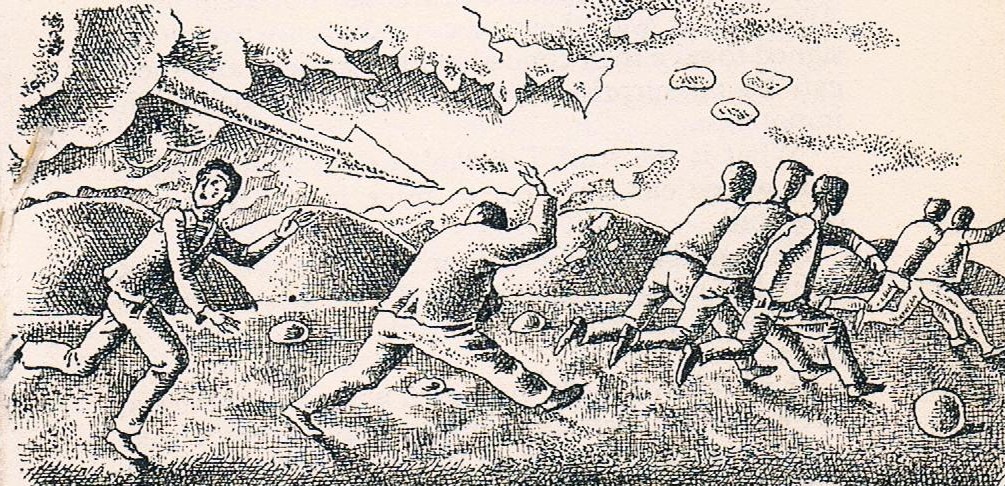 fleeing the cloud-spear
fleeing the cloud-spear
Zendexor: Didn't know you were sensitive, Stid. Fret not - it's all in a good cause. Namely, communication with the Saturnians.
Stid: Not sure I'd want to talk to a jelly.
Zendexor: Like the world-spanning organism of Clark Ashton Smith's
The Planet Entity, Suddaby's Saturnians fashion a mouthpiece for
themselves in the form of a man, so as to be able to talk with the
vastly inferior Earthlings. And from that point the narrative expands.
Harlei: Expands! It wasn't exactly narrow before! I hope it isn't all talk from then on!
Zendexor: No, it remains exciting, the more so because we begin to get answers to some questions. And we also meet more Saturnian creatures, like the "swimming saucer" which I haven't really got space to describe - I don't want to make this page too long, or give too many of the book's secrets away. Let me simply emphasize that this is an abundant story - a rich feast of the imagination.
...The road must have been composed of some absorbent material, because we all remarked that the deep bite of our keels left ruts only for a little way, the marks quickly closing again.
There, you see - a throwaway juxtaposition of impressions, mixing the wake of a ship with the ruts in a solid road; evidently Saturnian roads exhibit a combination of solid and liquid properties.
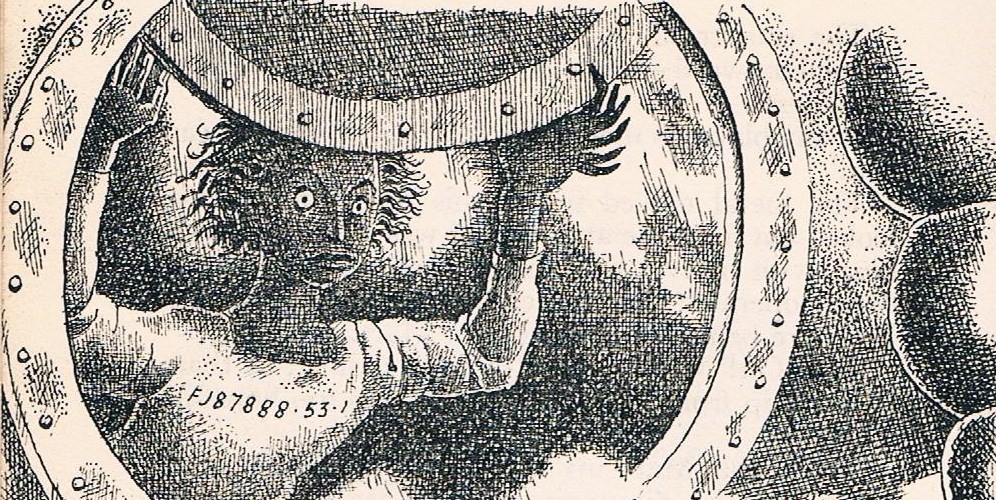 a Martian rescuer
a Martian rescuerI won't say too much more; won't go into the interesting arguments with the Saturnian humanoid construct; the more complex landscapes that the explorers get to see; the great conchoid city and the Master Concentrations or super-clouds.
Nor will I say how the men eventually escape their enigmatic captors and return to Earth - or how they reached Saturn in the first place (their means of transport bears some resemblance to the vessel described in Clark Ashton Smith's The Letter from Mohaun Los).
Suffice to say, this is a classic, and furthermore it's the only classic of its kind.
Excerpt: see Condensable Saturnian cloud-being.
>> Saturn





